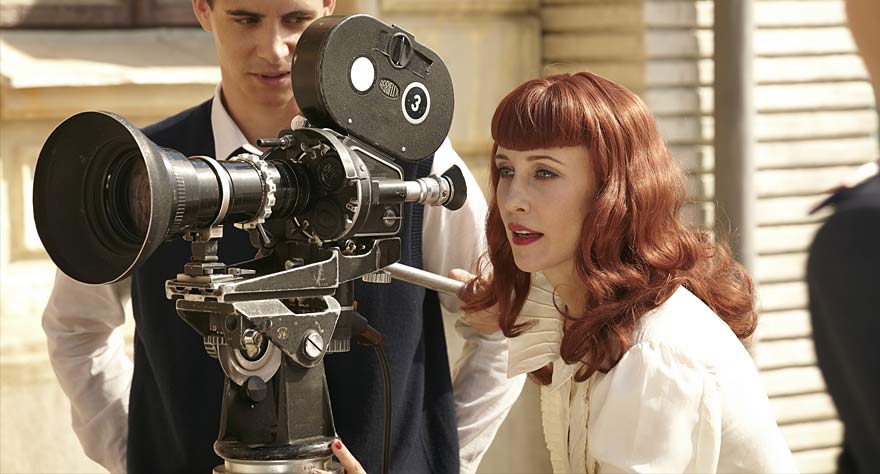
Solid lead performances and a riveting tale help prevent this historic heist flick from otherwise stealing your time.

Solid lead performances and a riveting tale help prevent this historic heist flick from otherwise stealing your time.
As part of Way Too Indie’s ongoing festival coverage, I recently had the opportunity to screen Chuck Norris vs. Communism, a Hot Docs 2015 entry. The excellent documentary focuses on actual events that took place in 1980s Romania. Screening at the 2015 Toronto Jewish Film Festival comes another Romania-set film with historical significance—only this time it’s a dramatization of history, not a documentation of it, and the timeline shifts from the 1980s to the late 1950s. The film is Nae Caranfil’s Closer to the Moon.
During World War II, Jews in Romania joined the anti-Nazi resistance organized by the Communist Party with the expectation that they would enjoy freedom once the Nazis were defeated. After the war, Communism, not freedom spread, and while some members of the resistance went on to become influential members of Romanian society, even that would be temporary. Closer to the Moon, based on a true story, looks at a collection of friends who joined the resistance and went on to bigger things. Then they decided to rob a bank.
That gang is led by Max (Mark Strong), a high-ranking police official, and includes history professor Iorgu (Christian McKay), journalist Razvan (Joe Armstrong), and scientist Dumi (Tim Plester). Rounding out the group is Alice (Vera Farmiga), the lone female and a political science expert.
Their heist, cleverly disguised as a film shoot, is witnessed by a crowd of mesmerized passers-by, including Virgil (Harry Lloyd), a waiter at a nearby restaurant. Virgil becomes so enamored by the film shoot that he goes into the Romanian motion picture business. A year later, his first directorial gig is a propaganda film that opens with the sentencing of the gang he thought was filming a fake robbery, not actually committing a real one. The gang is sentenced to death. Virgil is then charged with filming a complete recreation of the robbery—starring the actual gang—but one that falsifies most of what happened in the name of pushing the Communist agenda. In the process, Virgil befriends Alice, and their relationship becomes key to much more.
Director Caranfil, who also wrote the screenplay, chooses to present Closer to the Moon as a dark comedy, and there are times this approach works well. The gang display excellent chemistry when they’re together, from high-minded debates to carousing with prostitutes, it’s all done with political discourse. With an alpha male, a smart and sexy dame, high-quality supporting members, a well-planned caper, and always a good time, they’re not resistance veterans, they’re the Shabbat Pack. Filming the robbery reenactment, a notion so preposterous that it could only be based in reality, is also perfect for a comedic take. All of this is fantastic.
The film struggles, though, when it expands beyond the gang. A recurring gag involving the drunkenness of a legendary Romanian film director (Allan Corduner) is tired from the first flat joke, and the inclusion of Virgil’s landlords, an old Jewish couple with levity to their parts, seems to be set up from the first scene to serve as a key moment at the end of the film. There are also forced threads (to call them subplots would be to give them too much credit) involving Max’s wife and her brother. A pair of romances and unexpected melodrama involving Alice also serve as convenient plot points that distract from the overall story.
These things not only hinder the better parts of the film, they prevent an interesting conceit from finding life. Amidst the politics and propaganda, one Communist official, Holban (Anton Lesser), yearns to know why the gang stole the money. No one else cares about this. They stole something they didn’t need, knowing the possible result, and the not knowing the motive behind it gnaws at Holban. He even reaches the point where his obsession jeopardizes the film he has been charged with producing. This story could have been a great counterbalance to the gang’s antics, and Lesser is marvelous in the role, but it gets lost in the noise of the filmmaker’s other dalliances.
In addition to Lesser, performance standouts include Lloyd and Farmiga, but the film is carried on the shoulders of Strong, who is more than up to the task of playing the rebel-turned-cop-turned-criminal, with a motivation to risk his life that he makes you want to get in line to support.
Part heist flick and part history lesson, Closer to the Moon is best viewed as an entertaining, albeit flawed, entry in the sub-sub-genre of films about the aftermath of WWII.